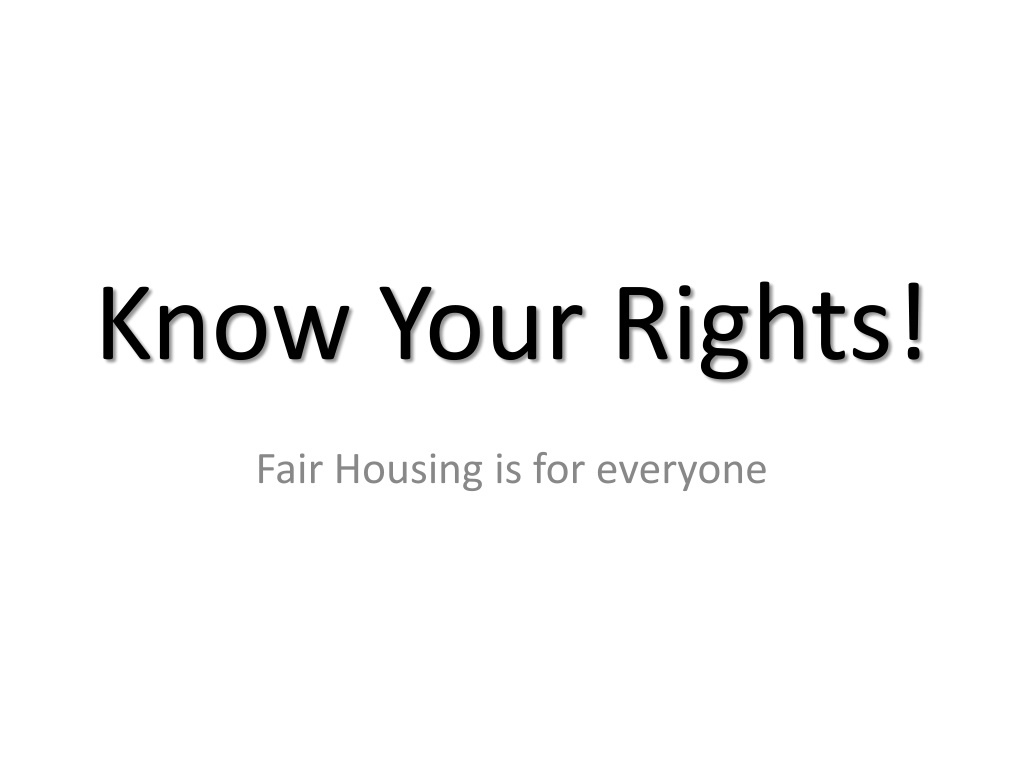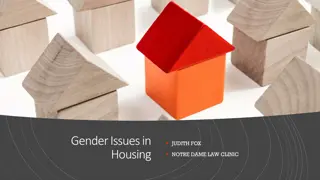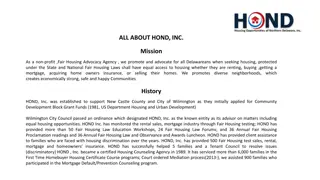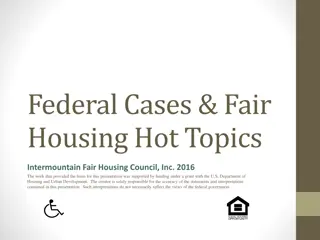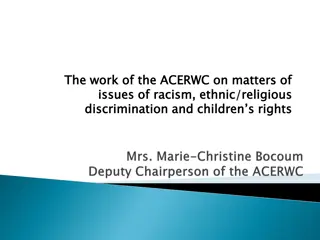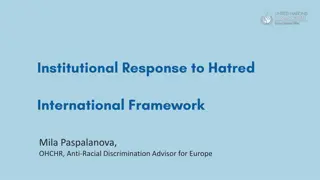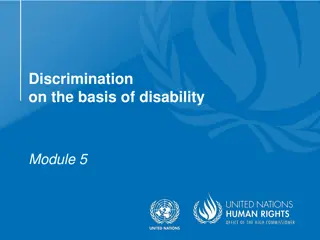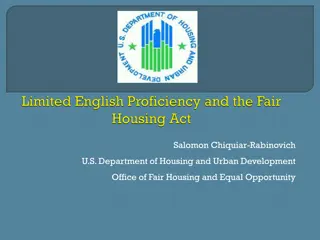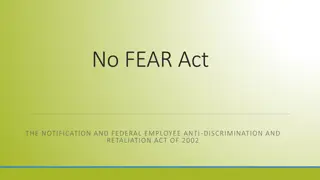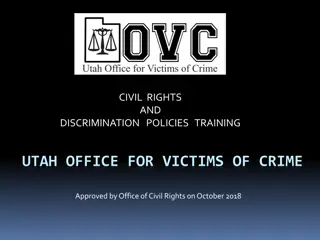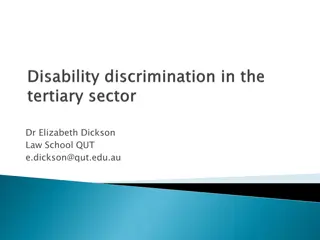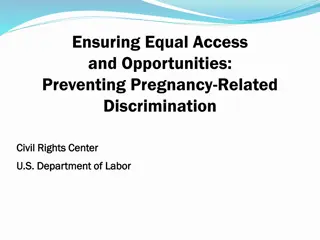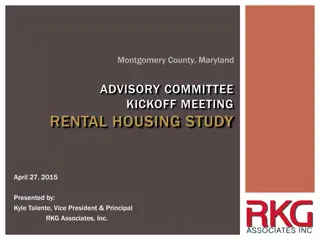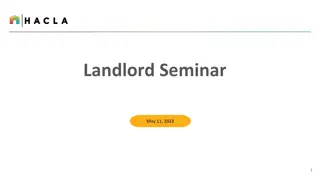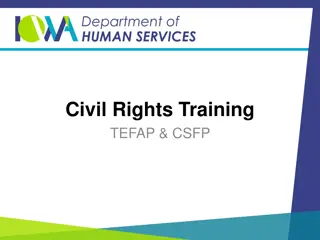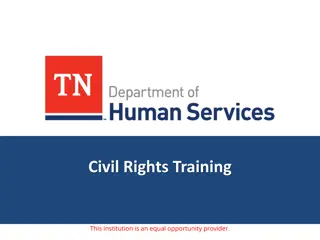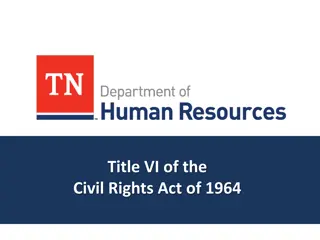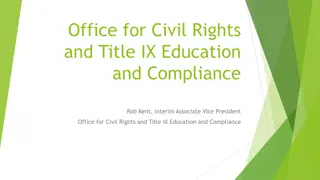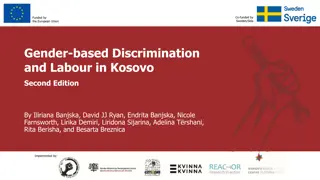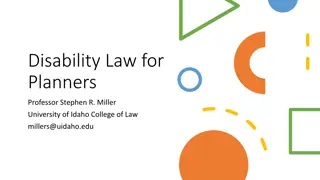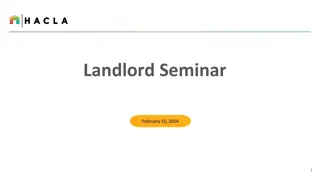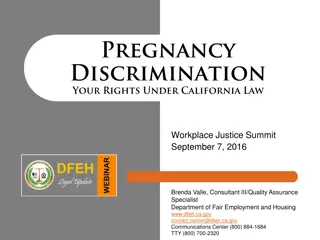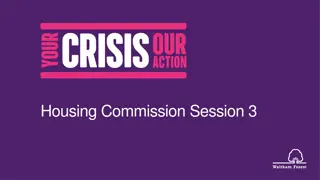Fair Housing Rights: Guide to Avoid Discrimination in Rental Housing
Understand your rights under fair housing laws to prevent discrimination in rental housing. Learn about protected classes, including why landlords cannot refuse to rent based on being a student or marital status but may consider credit history. Explore the boundaries regarding inquiries into disability and more.
Download Presentation

Please find below an Image/Link to download the presentation.
The content on the website is provided AS IS for your information and personal use only. It may not be sold, licensed, or shared on other websites without obtaining consent from the author. Download presentation by click this link. If you encounter any issues during the download, it is possible that the publisher has removed the file from their server.
E N D
Presentation Transcript
Know Your Rights! Fair Housing is for everyone
A landlord can refuse to rent to a person because he or she is a student. A. True B. False
Answer: True Housing providers (i.e. landlords, property management companies, real estate agents) cannot discriminate against someone based on membership in a protected class. Protected classes are defined by law. Being a student is not a protected class.
A landlord who is Catholic can refuse to rent to an unrelated man and woman who want to live together but are not married because the landlord s religion forbids that living situation. A. True B. False
Answer: False Religion is a protected class; however, it is the protected class of the housing seeker that matters not the housing provider. In this example, marital status is the protected class. People cannot be discriminated against based on whether they are married or single.
A landlord may inquire about the nature and severity of a rental applicant s disability. A. True B. False
Answer: False Disability is a protected class and a housing provider cannot ask rental applicants about the nature or severity of their disability. Note that housing providers may ask for verification of related need if a reasonable accommodation or modification request if that need is not visibly apparent.
A landlord may refuse to rent to a person because he or she has a bad credit history. A. True B. False
Answer: True Having a poor credit history (or any sort of credit history) is not a protected class. NOTE if this criteria is applied to a rental applicant, then it must be applied to ALL applicants, not just certain protected classes (ie based on sex, race, whether or not someone receives rental assistance)
An owner can refuse to rent to Section 8 (housing voucher) recipients because the apartment will not pass inspection. A. True B. False
Answer: False Public Assistance Recipiency is a protected class. A dwelling cannot be denied to someone because he or she has a housing voucher.
A person is denied housing because the housing provider believes that person has a disability, even though she does not, she is protected by fair housing laws. A. True B. False
Answer: True If you or someone associated with you: Has a physical or mental disability that substantially limits one or more major life activities Have a record of such a disability or Are regarded as having such a disability: You are protected by fair housing laws
Tenants with children can be required to live in ground floor apartments so that other tenants are not bothered by noise. A. True B. False
Answer: False Familial Status is a protected class Child who is not yet 18 Pregnant women Those in the process of securing legal custody of someone who is not yet 18 years of age Different terms and conditions cannot be set for people based on membership in a protected class
A landlord can reject a prospective tenant with a young child s application due to lead poisoning concerns. A. True B. False
Answer: False The Lead Law in Massachusetts requires dwellings to be made lead safe if a child under the age of 6 lives or will live there. It can be a costly endeavor, but the responsibility to make a dwelling lead safe cannot be avoided by not renting to families with young children. That would be discrimination based on familial status.
A tenant with a permanent brain injury requests that the landlord give the tenant a verbal reminder to pay rent each month. The landlord can immediately say no because he does not need to take on that responsibility. A. True B. False
Answer: False A landlord must engage in an interactive process with a tenant when he or she requests a reasonable accommodation. A R.A. is a change, exception, or adjustment to a rule, policy, practice or service that may be necessary for a person with a disability to use and enjoy a dwelling, including public and common use spaces. There must be an identifiable connection between the request and disability.
A landlord may ask a potential renter if he or she is currently using illegal drugs. A. True B. False
Answer: True Current illegal drug use is a permissible topic PROVIDED the question is asked of ALL applicants
A landlord may ask about an applicants ability to pay the rent. A. True B. False
Answer: True Ability to pay the rent is a permissible topic PROVIDED the question is asked of ALL applicants
A landlord who does not require a security deposit can require international students to pay a security deposit. A. True B. False
Answer: False National origin is a protected class Country of one s birth or Country where one s ancestors originated from
Protected Classes 42 U.S.C. 3601 Race Color Religion Sex Handicap (Disability) Familial Status National Origin Mass. Gen. Law c. 151B, 4 Race Color Religion Sex Handicap (Disability) Children National Origin Gender Identity Sexual Orientation Genetic information Ancestry Age (except minors) Marital Status Military Status Receipt of Public Assistance
Prohibited Conduct In the sale and rental of housing, because of protected class Refuse to rent, sell, negotiate for housing Make housing unavailable or deny a dwelling Set different terms, conditions or privileges for sale or rental Provide different housing services or facilities Falsely deny that housing is available for inspection, sale or rental To make, print, or publish any notice, statement, or advertisement that indicates a preference or limitation based on a protected class Coerce, intimidate, threaten, or interfere with anyone exercising a fair housing right or assisting others who exercise those rights
Prohibited Conduct (continued) In the sale and rental of housing, because of protected class For profit, persuade, or try to persuade homeowners to sell by suggesting that people of a particular race, etc. have or are about to move into neighborhood (blockbusting) Deny access to or membership or participation in any organization, facility or service (such as multiple listing service) related to sale or rental of dwellings, or set different terms and condition of such access, membership or participation Redlining: Lenders unfairly denying mortgage applications for homes in neighborhoods with high percentages of minority residents Steering: Advising individuals to purchase homes in particular neighborhoods or failing to show or to inform buyers of homes that meet their specifications due to their protected class
Massachusetts Lead Law Dwellings must be made lead safe if a child under the age of 6 resides or will reside there A family with a child under the age of 6 cannot be denied a rental property or evicted because of the presence of lead paint Resources are available to help make your home lead safe contact your local city hall or the MA Childhood Lead Poisoning Prevention Program for more information
Housing Vouchers It is illegal to refuse to rent to a person because he or she is a Section 8 recipient or the recipient of any federal, state, or local public assistance. It is illegal for owners to refuse to accept vouchers from particular housing authorities. It is illegal to advertise that Section 8 (or any other voucher) will not be accepted.
If you think you have experienced discrimination Boston Fair Housing Commission 1 City Hall Plaza, Room 966 Boston, MA 0220 Phone: 617.635.4408 TTY users, please call the MA Relay Service at 1-800-439-2370 www.cityofboston.gov/civilrights Fair Housing Center of Greater Boston 59 Temple Place #1105 Boston, MA 02111 Phone: 617-399-0491 TTY users, please call the MA Relay Service at 1-800-439-2370 www.bostonfairhousing.org Cambridge Human Rights Commission 51 Inman Street, 2nd Floor Cambridge, MA 02139 Phone: 617-349-4396 TTY: 617-492-0235 www.cambridgema.gov/HRC HUD FHEO Region I Thomas P. O'Neill, Jr. Federal Building 10 Causeway Street, Boston, Massachusetts 02222-1092 Phone: 617-994-8300 Toll Free: 1-800-827-5005 TTY: 617-565-5453 Suffolk University Law School (clinic) 120 Tremont Street Boston, MA 02108 Phone: 617-573-8778 TTY: 617-994-6813 http://www.suffolk.edu/law/academics/26012 .php MA Commission Against Discrimination One Ashburton Place Boston, MA 02108 Phone: 617-994-6000 TTY: 617-994-6196
